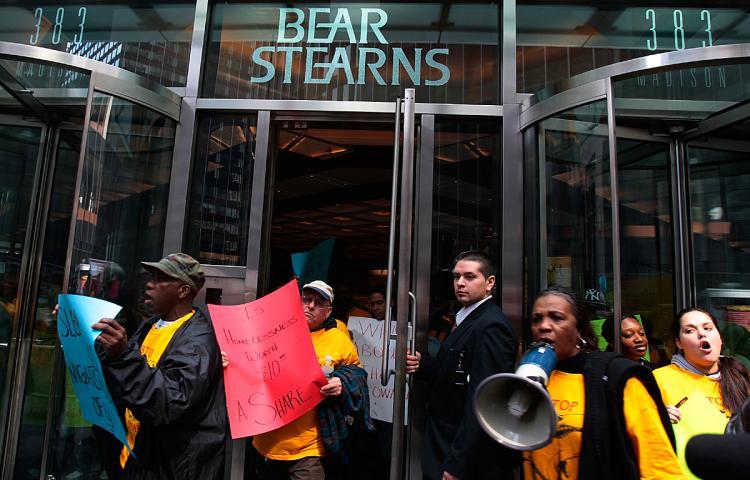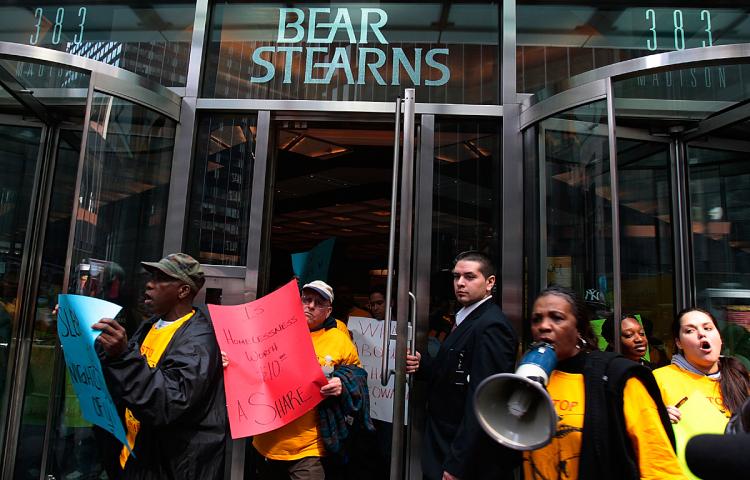Many business people praise capitalism and free market forces as long as they work in their favor. But when crisis arrives—or when market forces turn against them—they hurry to call for governmental help.
For example, during the bubble years we didn’t hear any complaints from within the housing or mortgage industry, but once the tide turns, lobbyists immediately call for bailout or federal funding.
In Israel, too, as long as the rate of the Shekel remained low we didn’t hear complaints from exporters, but once it started climbing—a positive change for quite a few citizens—some businesses went up in arms.
The question of “what is the appropriate role of government in the economy” is not a simple one, and it doesn’t have a simple answer. My opinion is that the government’s main role is to set the rules and enforce them, especially over the financial industry that provides funding for a wide range of public and private sectors.
However, the government should not be part of the economic game itself.
It is crucial to understand that times of economic recession and slowdown are an integral and healthy part of the free market. They serve to clear the imbalances and distortions in investment and consumption, which usually emerge in times of economic growth.
But more importantly, investors and speculators must understand that an investment carries with it a risk. Once they know that the government will come to their rescue every time they make a bad decision, they will begin to take excessive risks.
Former chairman of the Federal Reserve Alan Greenspan was known to lower interest rates every time there was a sign of a slowdown or a drop in the stock market.
His reactions were so aggressive that investors used to joke that they always have a put option—an option to sell that protects against drops—from Greenspan. Greenspan’s successor, Ben Bernanke, harbors the same attitude. A major part of today’s crisis is a result of excessive risks taken by investors and speculators who banked on the Federal Reserve to save them.
Once the credit crisis broke out, the U.S. government took action. It started with the Federal Reserve lowering interest rates aggressively, setting up mechanisms for emergency loans to financial institutions, and orchestrating the bailout of investment bank Bear Stearns. Then Congress passed countless laws to help the lenders as well as people who took out mortgages.
The biggest rescue operations may involve the two mortgage firms Fannie Mae and Freddie Mac. These two companies enjoyed U.S. government sponsorship, allowing them to raise capital at an extremely low cost. They then used this capital to buy mortgages from commercial banks and structured them into asset and mortgage-backed securities.
The operation of these companies both brought down mortgage prices for consumers and guaranted the timely payment of interest and principal to investors.
As I had mentioned, these companies, too, were part of the credit bubble of the recent years. They took on many risks—much more than they were allowed to—and now they’ve suffered huge losses to the point of possible collapse. This forced the federal government to officially guarantee the companies’ liabilities, practically nationalizing them.
These companies hold or guarantee about 50 percent of all U.S. mortgages, and have an 80 percent market share for newly issued mortgages. In other words, the federal government is almost the only mortgage provider today in the United States. This is unprecedented, and in my opinion intolerable.
Being on the verge of bankruptcy, Fannie Mae and Freddie Mac should halt their activities. The federal government should guarantee their debt, but they should be restricted from purchasing new mortgages. The federal government should take itself out of the mortgage market and allow free market forces to drive this market.
After almost ten years of an unprecedented bubble in real estate, housing and private consumption, the U.S. economy is in a state of imbalance. The attempts to artificially preserve the status quo should fail, justifiably. The road to recovery starts with the return of free market forces—Adam Smith’s “invisible hand.”
It will be a long and painful—albeit essential and healthy—process of recovery.
Itay Slonim is an investment manager from Tel-Aviv, Israel
For example, during the bubble years we didn’t hear any complaints from within the housing or mortgage industry, but once the tide turns, lobbyists immediately call for bailout or federal funding.
In Israel, too, as long as the rate of the Shekel remained low we didn’t hear complaints from exporters, but once it started climbing—a positive change for quite a few citizens—some businesses went up in arms.
The question of “what is the appropriate role of government in the economy” is not a simple one, and it doesn’t have a simple answer. My opinion is that the government’s main role is to set the rules and enforce them, especially over the financial industry that provides funding for a wide range of public and private sectors.
However, the government should not be part of the economic game itself.
It is crucial to understand that times of economic recession and slowdown are an integral and healthy part of the free market. They serve to clear the imbalances and distortions in investment and consumption, which usually emerge in times of economic growth.
But more importantly, investors and speculators must understand that an investment carries with it a risk. Once they know that the government will come to their rescue every time they make a bad decision, they will begin to take excessive risks.
Former chairman of the Federal Reserve Alan Greenspan was known to lower interest rates every time there was a sign of a slowdown or a drop in the stock market.
His reactions were so aggressive that investors used to joke that they always have a put option—an option to sell that protects against drops—from Greenspan. Greenspan’s successor, Ben Bernanke, harbors the same attitude. A major part of today’s crisis is a result of excessive risks taken by investors and speculators who banked on the Federal Reserve to save them.
Once the credit crisis broke out, the U.S. government took action. It started with the Federal Reserve lowering interest rates aggressively, setting up mechanisms for emergency loans to financial institutions, and orchestrating the bailout of investment bank Bear Stearns. Then Congress passed countless laws to help the lenders as well as people who took out mortgages.
The biggest rescue operations may involve the two mortgage firms Fannie Mae and Freddie Mac. These two companies enjoyed U.S. government sponsorship, allowing them to raise capital at an extremely low cost. They then used this capital to buy mortgages from commercial banks and structured them into asset and mortgage-backed securities.
The operation of these companies both brought down mortgage prices for consumers and guaranted the timely payment of interest and principal to investors.
As I had mentioned, these companies, too, were part of the credit bubble of the recent years. They took on many risks—much more than they were allowed to—and now they’ve suffered huge losses to the point of possible collapse. This forced the federal government to officially guarantee the companies’ liabilities, practically nationalizing them.
These companies hold or guarantee about 50 percent of all U.S. mortgages, and have an 80 percent market share for newly issued mortgages. In other words, the federal government is almost the only mortgage provider today in the United States. This is unprecedented, and in my opinion intolerable.
Being on the verge of bankruptcy, Fannie Mae and Freddie Mac should halt their activities. The federal government should guarantee their debt, but they should be restricted from purchasing new mortgages. The federal government should take itself out of the mortgage market and allow free market forces to drive this market.
After almost ten years of an unprecedented bubble in real estate, housing and private consumption, the U.S. economy is in a state of imbalance. The attempts to artificially preserve the status quo should fail, justifiably. The road to recovery starts with the return of free market forces—Adam Smith’s “invisible hand.”
It will be a long and painful—albeit essential and healthy—process of recovery.
Itay Slonim is an investment manager from Tel-Aviv, Israel


